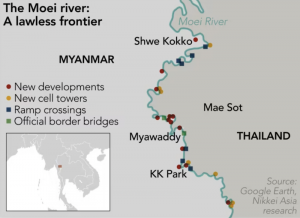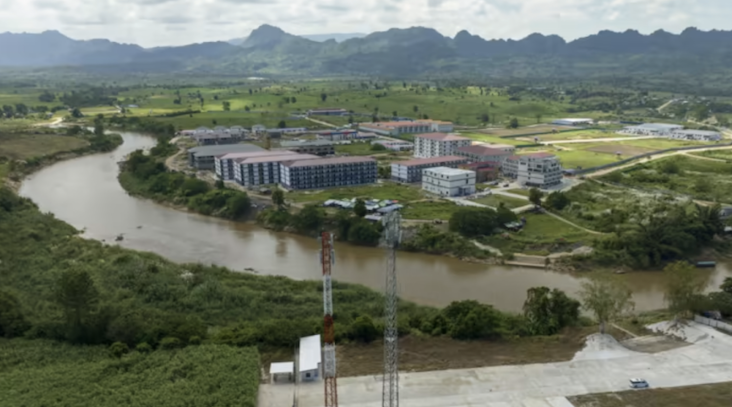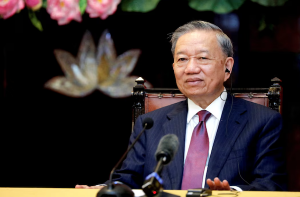Southeast Asia has become a major breeding ground for transnational criminal networks that originated in China, according to a new report formally launched on Friday.
The report, by a study group led by Jason Tower and Priscilla Clapp from the United States Institute for Peace (USIP), said a conservative estimate of the funds stolen by criminal syndicates last year was close to $64 billion.
Myanmar, Cambodia and Laos are at the epicentre of the region’s scamming, but most countries in ASEAN are linked to the gang’s operations by facilitating illegal trafficking of “several hundred thousand people” forced to work in the scam centres, as well as providing a base for money laundering of criminal proceeds, and helping to develop the technology the gangs need for sophisticated gambling, scamming and financial fraud, it said.
ALSO SEE: China Sees Growing Unrest Over Cases of Financial Distress
Many of the scammers are actually “forced labour victims” who came from more than 50 countries, only to find they were duped by fraudulent online ads for lucrative high-tech jobs, then trafficked to compounds where they are held by armed gangs in prison-like conditions, it said.
Massive scamming operations in Myanmar close to the borders of China and Thailand became key drivers of the country’s civil war, it said.

Scam centres are dotted along the western bank of the Moei River, which forms the border between Myanmar and northwestern Thailand (graphic courtesy of Nikkei Asia).
Local militias allied to the military junta protect multiple compounds in which tens of thousands of people are held against their will and forced to work on “industrial scale” scamming operations in the Kokang area in the country’s northeast and southeastern Karen State near the Thai border.
And while many compounds in the Kokang region were shut down late last year by local ethnic resistance groups, and close to 50,000 people returned to China, the crime gangs regrouped and increased their activity in the Myawaddy region across the Moei river from the town of Mae Sot in northwest Thailand.
The two other major regional hubs are in fortified enclaves in southern Cambodia, where casinos and hotels were left empty during the Covid pandemic, and the Golden Triangle Special Economic Zone adjacent to the Mekong River in northern Laos.

The cyber scamming in Cambodia “is estimated to exceed $12.5 billion annually – half of the country’s GDP – with many compounds owned by local elites,” the report said, adding that the crime gangs in Mekong countries reaped $43.8 billion a year (40% of the combined GDP of the three countries).
A large chunk of this money goes to the Myanmar military and the local Karen militia formerly known as the DKBA (led by Colonel Chit Thu), plus ruling elites in Cambodia and Laos.
These criminal activities are having an increasingly negative impact not only on China and Southeast Asia, but all around the world, the report said.
“As the criminal networks have become more powerful, the Chinese state, recognizing that it can no longer control them, has become more concerned about the threat their activity poses to its citizens,” it said.
The United States has become a major victim of the ASEAN scammers, with losses of several billion a year, although a California prosecutor told a press conference in Bangkok on Friday, the real figure is likely much higher, given that many victims are often reluctant to talk publicly about suffering very humiliating losses.
USIP Burma country director Jason Tower said the majority of crime groups originated in China and grew from online gambling centres in the Philippines during the Duterte era, then became embedded in the ASEAN region and began targeting people worldwide after the end of the Covid pandemic.
Erin West, a prosecutor from California, said scammers aim to find the extent of people’s assets, then trick them into betting increasing sums. Speaking at the Foreign Correspondents Club in Bangkok, she said the US estimate of $5 billion losses was “woefully low” and suggested the total sum lost by US citizens could be 10 times that figure.
NEXT: Part 2: The Massive Impact of Scamming Operations on ASEAN
- Jim Pollard
ALSO SEE:
High-Tech Asian Crime Wave: Cyber Scams, Casinos Loot Billions
Big Tech ‘Doing Little’ to Counter Rampant Scams on Social Media
Macau Junket King Alvin Chau Gets 18 Years For Casino Crimes
Crime Gangs Control Some Myanmar, Laos Economic Zones: UN
























